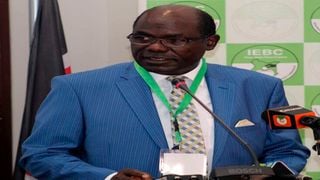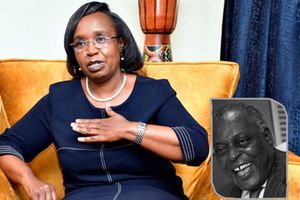
Mr Wafula Chebukati, chairman of the Independent Electoral and Boundaries Commission.
| File | Nation Media GroupPolitics
Premium
IEBC rejects nomination rules of 89 parties to ensure credible polls
The electoral commission has rejected nomination rules submitted by dozens of parties because they violate the law, exposing how primaries are bungled and subsequently compromise the General Election.
Last night, IEBC chairman Wafula Chebukati confirmed 89 parties submitted nomination rules but after a review, the commission had found “none of the political parties has fully complied with the requirements of the law.”
He added the commission had communicated to the parties to revise their nomination rules and procedures pursuant to the Elections Act, 2011, within 14 days.
Void and rejected
“Political parties are notified that the commission will issue a certificate of compliance to parties whose nomination rules are compliant with the prescribed regulations. However, nomination rules that fail to comply with the requisite regulations shall be declared void and rejected.
“Consequently, the affected political parties will not be issued with a certificate of compliance and shall not participate in the 2022 General Election,” Mr Chebukati warned.
President Kenyatta’s Jubilee, Deputy President William Ruto’s United Democratic Alliance (UDA) and Mr Raila Odinga’s Orange Democratic Movement (ODM) are among those whose rules were found incapable of guaranteeing fair nominations.
In areas where a party enjoys massive support, the party ticket is hotly contested as whoever secures it is almost guaranteed of victory in the elections, which informs the importance of fair nominations in deciding the country’s leadership.
The Kriegler Commission that investigated the botched 2007 elections cited rigged party primaries among a series of electoral missteps that made it impossible to hold credible polls.
“The legal standard for valid nominations does not seem to take into account the primacy of fair nomination procedures for the fairness of the overall election itself, even as established in the constitution and rules of the political party. This generally breeds impunity in the electoral process,” the Independent Review Committee (IREC) stated in its report after investigating the bungled elections that nearly plunged the country into civil war.
The Nation yesterday established that IEBC had written to the parties after scrutiny of the rules submitted on October 18 uncovered failure to comply with the laid down requirements.
Some lacked clear guidelines on how to identify aspirants for nomination to contest various seats as well as formulation of the party list, which refers to the nominees for the top-up slots in case the party is eligible based on performance after elections.
Other parties did not demonstrate how they would enforce the Code of Conduct to address electoral malpractices.
The code prohibits a political party from engaging in or encouraging violence by its members or supporters, intimidation of opponents, bribery, advocating hatred, ethnic incitement, the use of state resources for partisan campaigns, among others.
Loophole
Yet others, according to sources at the commission, did not indicate signatories for nomination certificates, a loophole that could be used to short-change victors in nominations.
“Others have no clear provisions on the waiver for nomination fee for the special interest groups,” added the official from the commission.
Other outfits had no clear internal party dispute resolution mechanisms.
This is also likely to be exploited to disenfranchise aspirants who lose nominations unfairly.
Following the scrutiny, IEBC has written to the parties to address the concerns.
IEBC acting CEO Hussein Marjan had told the Nation in an earlier interview that by the October 18 deadline, the commission had received nomination rules from 91 parties.
“By November 15, 2021 the commission will be required to issue nomination certificates to those who will have complied,” Mr Marjan had explained.
Yesterday, Jubilee Secretary-General Raphael Tuju said the ruling party will comply with the law as required by the commission.
“I will have to consult with our legal team whose responsibility is compliance and look at the issues raised by IEBC. We have to comply with the law and if IEBC has raised anything that the law requires us to comply with, then we will do exactly what we are required to do,” Mr Tuju said.
ODM Secretary-General Edwin Sifuna said they were yet to receive the communication from IEBC by last evening. “We will get back when we receive the communication,” said Mr Sifuna.
Wiper Vice Chairman Mutula Kilonzo Jnr also said the party was yet to be notified by IEBC.
Parties were required to submit their nomination rules to the electoral commission by October 18, six months before primaries.
They have between October 18 and January 16 to file any amendments to the nomination rules.
Parties are required to submit names of candidates for party primaries to the commission by April 9, then conduct primaries between April 16 and April 22.





